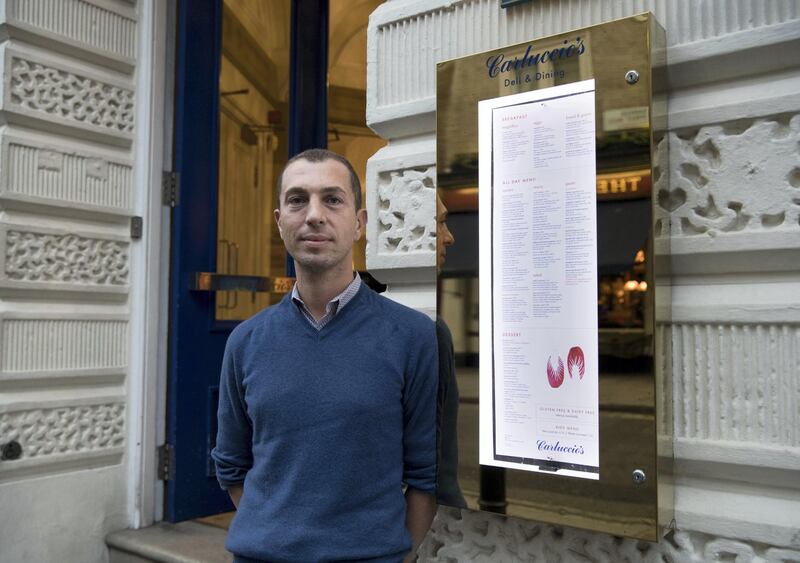Step inside a café or restaurant in London and expect to hear a symphony of different languages from behind the kitchen door. Italians, Poles, Swedes, Hungarians and many other EU migrants call Britain home, serving Brits their morning coffee kicks or rustling up a 5-star meal.
Brexit could change all of that, upending Britain’s hospitality industry as the UK looks to end freedom of movement.
“Imagine how ludicrous it would be running an Italian brand in the UK and not being able to have Italians working for it. It’s nonsensical,” said Mark Jones, CEO of Carluccio’s, one of the UK’s most popular and recognisable Italian chain restaurants.
He employs 2,300 people. Of those, 1,550 are non-British EU citizens living in the UK. By far and away, EU migrants hold his business together.
Of them is Italian Sebastian Ligato. He fell in love with London as a child on holiday. The occasion had stuck with him so much so that he decided to uproot himself 17 years ago from Genoa, Italy, aged 21.
“I wanted to learn English. And also because I wanted to work in a different country,” he told The National.
“Back then the UK was part of Europe, it was easy to come over here and get a job. There was not any sort of rules around freedom of movement for work.”
Much has changed since 2001 when Britain welcomed migrants from fellow EU member states to plug the country’s growing labour shortage. Thanks to freedom of movement, Ligano has successfully established his career, rising up the ranks of seniority.
Andrea Magno, 32, is another Italian to call the UK “home”. He arrived from Turin with his girlfriend in 2012 with little grasp for English.
Despite the UK’s increasing act of political isolation, he is adamant that he could never return to Italy with the rise of a populist government.
“I’m so ashamed of what’s happening in Italy. We’re going back to fascism. If I can choose where to be, I would choose not to be in Italy”.
Today, he commands the language fluently while managing Black Sheep Coffee, a bustling cafe in the heart of London’s financial district. He’s noticed a sharp decline in CVs and resumes handed to him, from 30 a week to just 2 a week immediately after the Brexit vote.
Carluccio’s boss Marks Jones thinks it’s too soon to predict whether his business will face staff shortages, but worries about the long term damage for the Italian restaurant.
“My worry is that pipeline of new talent is turned off. You tend not to feel that on day one. It feels that it’s something over a period of time which would squeeze our business,” he said.
Long term problems
Hungarian Zsolt Ferencz takes a quick 10-minute break from marshalling his chefs rustling French cuisine at upscale restaurant Margaux, in the rosy London borough of Kensington.
The executive chef spearheads 10 cooks spread over 2 restaurants. All of them are EU nationals from outside the UK.
Recruitment in the hospitality industry is already challenging. Brexit is expected to make it that much harder.“We have chefs from Italy, Sweden, Poland, Romania, and those guys are not all professionals. Some of them started as kitchen porters then became chefs later on,” Ferencz told The National.
Once Britain officially leaves the EU, Ferencz thinks small businesses in the hospitality industry could face rising food prices and difficulties finding workers. He is unsure whether local labour is adequate enough to plug the gap.
“In the last 5 years, I’ve maybe worked with only 2 British chefs.”
Margaux currently has ties with a Swedish school that sends students every year to his kitchen. Brexit will scupper recruitment schemes such as his.
“I have 2 Swedish chefs who used to be apprentices. That won’t work in the future.”
Ferencz moved to London in 2004 aged as soon as his native Hungary joined the EU.
Fifteen years later, the Hungarian is visibly dismayed by Brexit.
“I’m more worried about the jobs, about what’s going to happen to the young Swedish and Italian chefs. If they [UK government] are going to make it difficult for young professionals to come here, why would people come here? They’ll just go somewhere else. Europe is pretty big.”
As he departs to oversee preparations for the evening shift, Ferencz warns Britain about the dangers of closed borders by reminiscing on his Hungarian childhood.
“It was very difficult being in the Eastern Bloc and difficult to travel. We weren’t even allowed to travel to the west, only keeping to the east (of Europe). I remember it as a kid. That’s why I sometimes think the world is moving backwards.”
“For young chefs, it’s so important to work, pick up your skills and move around. This is how you learn and become a great chef. So they’re going to close the borders again? It’s just crazy,” he says.
“Absolutely crazy.”






